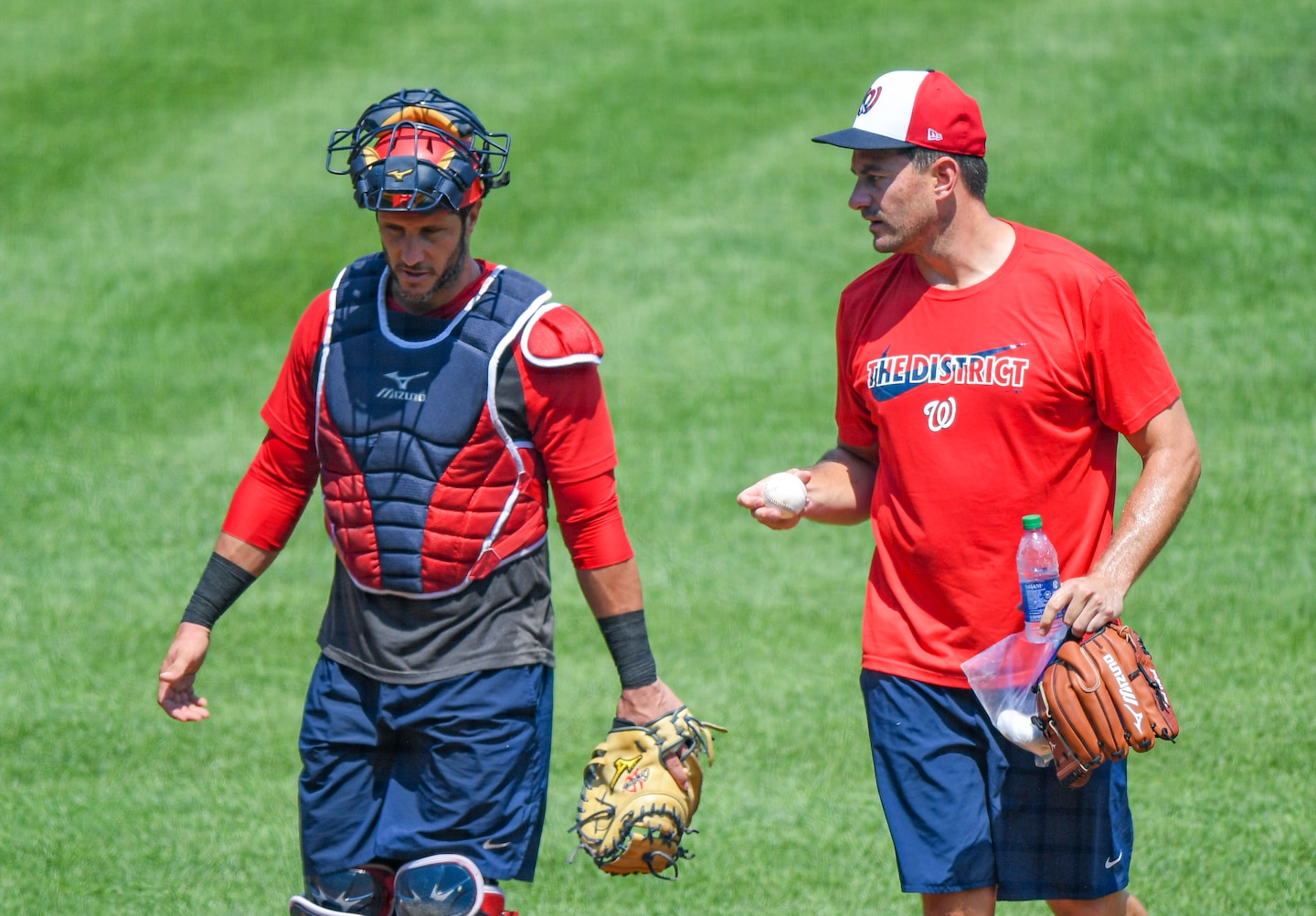For Daniel Hudson, playing in 2020 means barely seeing family. He’s not alone.

You may remember what happened next: Hudson missed Game 1 of the National League Championship Series to be present at the birth of his third daughter.
So whether Hudson would play this season, one complicated by the novel coronavirus, required discussion. Hudson, 33, says that he and wife, Sara, had a “long conversation” about whether it made sense for him to opt out. Since he has no preexisting medical conditions and is not considered “high risk,” the reliever would forfeit his prorated salary for 2020. He would skip half of the two-year deal he signed with the Nationals this winter. And health and money aside, he would miss the chance to build on his best season in almost a decade.
They decided he would play. But that doubled as a choice to hardly see each other for at least three months.
“Yeah, I mean, it’s tough, but it’s just part of it,” Hudson said Monday. “It’s probably more difficult on my wife than anyone, having three kids under 6 by herself. But she was willing to make the sacrifice, and I felt like I needed to be here with the guys to try to get this thing going.”
Around the majors and around the Nationals’ clubhouse, players and coaches are making similar trade-offs. The NBA is staging the rest of its season inside a bubble to negate travel and exposure to the public. The NHL is using two Canadian hub cities, Edmonton and Toronto, to do the same. Baseball, conversely, is letting players sleep at home after workouts and games. There will be regional travel once the regular season begins, and each club will host half of its schedule.
But home is a tricky word for professional athletes. There’s a misconception that, with this model, most baseball players will wake up around their wives and kids each morning. That’s only the case for some. Just three Nationals — Max Scherzer, Stephen Strasburg and Ryan Zimmerman — have a permanent residence in the D.C. area. The rest, like Hudson, have settled elsewhere, often because they bounce between teams and want a hint of stability.
The Hudsons have a house in Phoenix. So does Javy Guerra, a journeyman reliever with a wife and baby boy. Yan Gomes, his wife and two kids spend winters near Knoxville, Tenn. In normal years, their families would make frequent trips to see them on the road or in Washington. But in 2020, at the height of abnormal, playing baseball is a certain kind of quarantine.
“They deserve all the credit, not us,” Hudson said of Sara and other partners. “We just go play baseball. They hold the fort down. They are rock stars in my eyes.”
Hudson expects Sara and the girls to visit him soon for a week in Washington. There’s a short window to see each other before the Nationals’ first road trip starts July 29. Then his family will head back west, and they will resume a familiar routine: FaceTime in the morning, FaceTime in the afternoon and maybe a third FaceTime before bed if Hudson is free.
Gomes’s wife, Jenna, and their two kids are with him in Washington. The catcher says he has been a “tough dad” and “tough husband” because the MLB protocol urges extreme caution away from team facilities. Jenna and the kids, ages 3 and 6, are mostly stuck in the apartment. Gomes has to tell his daughter, Brooklyn, that they can’t go to the park. He has explained the virus to her and has since seen her set an example for her younger brother.
Gomes’s wife and children will be here for a couple of more weeks. When the Nationals hit the road, they will head to Tennessee.
“It’s something we weren’t quite ready for. I don’t think anybody really was,” Gomes said Tuesday. “But teaching your kids this young about hygiene and sanitizing and being careful and stuff like that is probably a pretty good lesson in the long run.”
Manager Dave Martinez knows the sharp tug of family and home. Toward the end of his 16-year career as a player, he lamented the missed birthdays, soccer practices, all the milestones he heard about in odd-hour calls. He tried to be in Florida whenever possible, but there were so few breaks in the schedule. When he retired in 2001, at 36 years old, it was partly to become a full-time dad.
On Tuesday, after another intrasquad scrimmage, Martinez called this a “tough” situation that will require sacrifice and isolation. In 2019, in the dead heat of summer, Martinez reflected on how his experience informed this viewpoint: “It’s hard. You miss a lot,” he explained then, in the visiting manager’s office at Wrigley Field. “And not being there, not knowing what’s going on in school or whatever it is, that can weigh on the kids, and that’s the last thing you want.”
Now, in the grips of the pandemic, it’s only more pressing and true.






